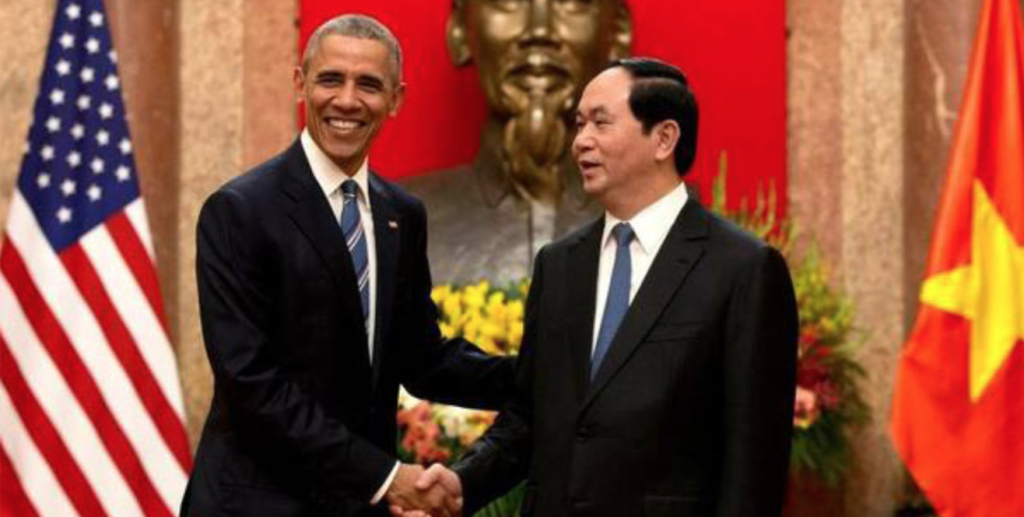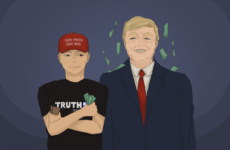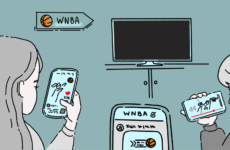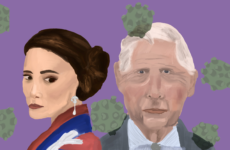
Former President of the United States Barack Obama meets with Vietnamese President Tran Dai Quang in Hanoi last fall.
President Trump P’00 and other modern American leaders often trumpet the importance of creating allies in Southeast Asia. This complex region simultaneously includes the fastest growing economies in the world, remnants of socialist and genocidal regimes, and both highly and under-developed nations. More important to interests of national security, the region provides something of a buffer against the seemingly ever-growing power of the People’s Republic of China. While the United States should attempt to forge better relations with China as a long-term solution to fears of the country replacing us as the dominant world power, for now, we should look to an old foe as a new ally: Vietnam.
The history of American and Vietnamese relations is by no means ancient, but it is richly complicated. When examined, it is clear that the United States and Vietnam can and should become close allies. Shortly after World War II and liberation from Japanese occupation, Vietnam became embroiled in a war for independence from French colonial rule. Ho Chi Minh, one of the founders of the Communist Party of Vietnam and subsequent Premier of Vietnam, actually asked for President Franklin D. Roosevelt’s support against French colonialism during World War II. Roosevelt, an ardent anti-colonialist, pledged his support for Vietnamese independence — but this promise was forgotten when Harry S. Truman took office after his death. Premier Ho’s admiration for America was so great, in fact, that much of the Vietnamese constitution was based directly on the American constitution. Historically, the United States has missed out on the chance to make Vietnam its strong ally, but that should no longer be the case.
One of the primary factors that has long kept America from entertaining an alliance with Vietnam is the ruling political party: The Communist Party of Vietnam. While communist regimes across the world have a history of violence, economic stagnation, and failure, this generalization does not apply to Vietnam and should not prevent us from working with them. Vietnam is one of the world’s fastest growing and most dynamic economies — last quarter, its G.D.P. grew by 6.68%. Clearly, Vietnam would be a strong ally from an economic perspective alone. Additionally, Vietnam is essentially communist in name only. Since the Doi Moi reforms of 1986, Vietnam has privatized its economy and focused on splitting the massive and ineffective state-owned enterprises characteristic of a planned economy. Vietnam’s emphasis on reforms shows that it is quickly transitioning to a capitalistic and free economy, and that Americans have nothing to fear from the mere label of “communist.”
Furthermore, Vietnam would be a valuable ally for America because of the strategic importance of its location. It sits in the South China Sea, the world’s busiest shipping strait, and south of the People’s Republic of China. This means that a military alliance with Vietnam would be a valuable deterrent against Chinese expansion and island-building goals in the South China Sea. Vietnam and the U.S. actually share an interest in stopping Chinese expansion in the area, meaning that our two nations could effectively work together towards a common goal.
The United States has actually already initiated attempts to form a closer relationship with Vietnam. One of these is the Vietnam Education Foundation, a State Department-sponsored scholarship program for Vietnamese students to study at American universities. The newest major project in American-Vietnam relations is also related to academia: The Fulbright University in Ho Chi Minh City.
Fulbright University will be Vietnam’s first private university, with classes taught in English and a curriculum composed of humanities and STEM courses. The University is also supported by the State Department, as well as Secretary John Kerry, Senator John McCain, and Governor Bob Kerrey — all veterans of the Vietnam War. In fact, Governor Kerrey, a Medal of Honor recipient who lost his leg during the war, has been appointed as the first chairman of the Fulbright University. If veterans of perhaps America’s most gruesome modern war can work with the Vietnamese people in the spirit of friendship and education, then it is absolutely possible for our governments to collaborate as well.
Under an administration that seems to by trying to alienate most allies and long-time friends of the United States, whether they be members of NATO or our neighbors, we need all the international support we can get. This is especially true in Southeast Asia, which is quickly growing as the world’s most important economic and political region. While the United States should focus on better relations with China and other nations in Southeast Asia in the long run, in the short term, we should concentrate our efforts on cultivating a stronger friendship and alliance with the great nation of Vietnam.




